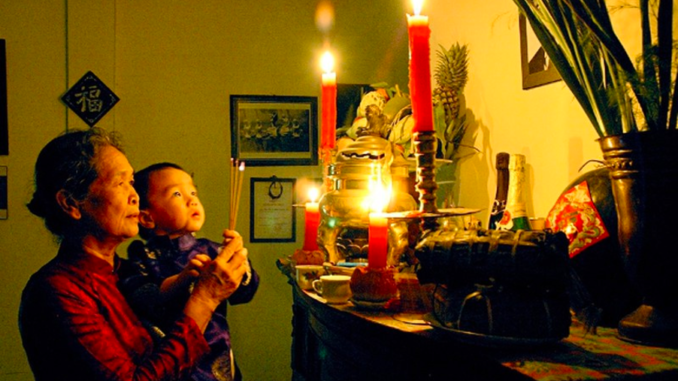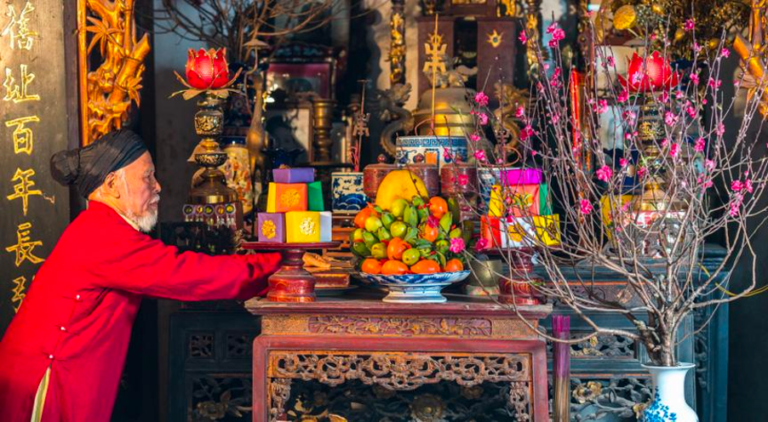
Brief introduction to ancestor worship in Vietnam
Ancestor worship, known as Tín ngưỡng thờ cúng Tổ Tiên in Vietnam, dates back to the Dong Son culture (1st millennium BC), even to pre-Dong Son culture. The original foundation of the Vietnamese national community, it represents a factor of uniqueness, family and social cohesion, for a people that has managed over its long history to reconcile a wide spectrum of religious, philosophical, cultural and political influences.
This practice of veneration of ancestors through worship by their descendants is not specific to East Asia since it is also found in some countries of Africa and South America. Whatever the latitude, ancestor worship refers to the unity of the clan, the family, thanks to its cohesion on the mother earth and the harvests she can produce.
The cult of ancestors in Vietnam, a brief historical overview
Ancestor worship is based on the belief that the soul of a deceased survives after death and that it then gives itself the mission to protect its descendants, but also to reprimand them if necessary. There is therefore no separation between the world of the living and that of the dead, the two being interconnected by a set of consciousness, symbols and rituals.
The practice reflects the influence of patriarchy and Confucianism on Vietnamese culture.
Since Confucianism was introduced to Vietnam during the Chinese domination, filial piety, the most fundamental of Confucian values, has been very much appreciated in Vietnamese families.
Note that worship is here used in the wide sense: the ritual of ancestor worship can be addressed at the state level, with its men of honor and virtue (we think here especially of the Hung kings). It can be practiced towards the village, with its tutelary geniuses and virtuous inhabitants who have worked for its prosperity and security. And finally, ancestor worship can be practiced at a third level, that of the family and its deceased ancestors.
Accordingly, children are obliged to respect their parents in life and to remember them after they die. The practice of ancestor worship is thus an expression of “filial piety” toward deceased parents, relatives and ancestors.
The cult of ancestors today

The ancestral altar is set with ancestral tablets and pictures, together with an incense burner bowl in the centre as a symbol of the stars. Inside the bowl usually stands a circular incense stick that represents the universe. Two candles are placed on the sides of the altar to embody the sun (left) and the moon (right).
On special occasions like ancestors’ death anniversaries or the Lunar New Year, special rites are performed to communicate with the dead. The rites consist of making offerings of fruits, foods and wine; lighting the candles; and burning incense before praying in front of the altar.
Tet, or Lunar New Year, is the most important festival of the year for Vietnamese people and a time for family reunions. It is an opportunity for descendants to invite the souls of their ancestors to join the family’s Tet celebration.
On these days, every home has a tray filled with five types of fruits placed on the ancestral altar. The fruits may include a bunch of bananas, pomelo, persimmon, pear and tangerine in different colours to represent the desire for “phú” (prosperity), “quý” (notability), “thọ” (longevity), “khang” (health) and “ninh” (peace).
The altar may also be decorated with a branch of peach blossoms in warm pink to drive away evil spirits and bad luck.
The ancestral altar occupies a prominent place in every Vietnamese home, no matter whether the family is rich or poor. It is a manifestation of the country’s culture that shows its respect for both the past and the future./.
We would be pleased to have you visit and take in our breathtaking scenery, unwind on our white sandy beaches, immerse yourself in our exquisite culture, and get to know the people of the friendliest nation. Especially, to savor our delicious food at restaurants with Michelin ratings or to come and participate in our incredible mega-events involving culture, music, sports, and tourism!
Make your plan to Vietnam right now by obtaining a Vietnam visa at https://www.vietnam-evisa.org. We, a reputable and reliable Visa service, will assist you turn your plan into reality at the very first step.
Source: VNA